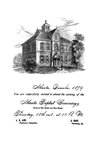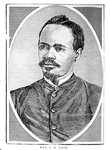





Editor’s note: This is one of a series of articles commemorating the 200th anniversary of the Georgia Baptist Convention, which will hold an annual meeting Nov. 13-15 at Warren Baptist Church in Augusta. Congregations can register for the annual meeting here.
In the years following the Civil War, many new African American congregations were started by the freedmen. This was followed by the creation of new African American Associations in 1866 and the state-wide Missionary Baptist Convention of Georgia organized in 1870.
After the removal of Federal troops after Reconstruction in 1872, African Americans were increasingly marginalized from business and political circles. Churches became the centers of African American community. Churches were one place African Americans had autonomy and self-determination.
The primary goals of the races were different in the aftermath of the Civil War. Whites were focused on the economic reconstruction of the South. African Americans pursued the goal of “uplifting the race” through education and job training.
As boundaries were being defined between the Baptist Home Mission Boards of the North and the South, one area of cooperative work was agreed upon early. This was the work among the “freedmen” of the South. Northern and Southern Domestic Boards, and Southern State Conventions would partner in this work with newly formed African American Baptist State Conventions.
The success of this partnership in Georgia reflected the strategic leadership of three men, Dr. S. S. Cutting, the Corresponding Secretary-Treasurer of the Northern Home Mission Society, Rev. Frank Quarles, the President of the African American Missionary Baptist Convention of Georgia, and Dr. J.H. DeVotie of the GBC State Mission Board.
In Georgia, this ministry focused on five areas of work. They were higher education, pastor Training Institutes (leadership development), Sunday School work, general evangelism, and general support for the African American Baptist State Convention.
In Georgia, the agreement between the three boards included unlimited support for African American higher education from any source, the commissioning of African American State Missionaries, that the supervision of African American missionaries would primarily be the responsibility of the GBC State Mission Board because the African-American State Convention lacked a full-time administrator, and general support (financial and technical) of the African American Convention.
The prerequisite for African Americans appointed as State Missionaries was that they be graduates of the Augusta Theological Institute (Atlanta Theological Seminary after 1879). As was the case with nearly all early GBC State Missionaries they were bi-vocational. The annual association statistics of the MBCG were included in the GBC minutes until 1881.
The GBC had been instrumental in supporting the establishment of Augusta Theological Institute in 1867. Assistance was provided with its relocation to Atlanta in 1879 where it was renamed Atlanta Baptist Seminary and later Morehouse College. A second school, the Atlanta Seminary for Females, opened in 1881. It would eventually be renamed Spellman College.
The GBC began providing Pastor Training Institutes for African American pastors and lay leadership. These were held across the state and lasted from two to eight days. Instruction included Biblical training, Sunday School work and other practical training which benefitted these men, most of whom had very little formal education. The 1884 report for this work stated that 26 Institutes had been conducted in the previous year with 308 pastors and 306 deacons enrolled.
This ministry also assisted African American pastors to obtain free books provided by the American Baptist Publication Society for their use. The work of the Pastor’s Institutes was so effective that they became the models for Institutes organized for benefit of white pastors during the 1890s.
“Sunday School Evangelists” were appointed “to organize and fortify” African American Sunday School work. Early African-Americans appointed by the State Mission Board included F.M. Simmons, Edwin P. Johnson, Collins H. Lyons and J.C. Bryan. White State Evangelists were instructed to “preach as often as you may be able to the freedmen and exert your influence to organize and fortify Sabbath Schools.”
African Americans were also commissioned to serve as general “State Evangelists.” They preached revivals, and helped conduct training institutes for pastors and lay leadership. G. B. Mitchell and Emmanuel King Love were two of the first appointed to this ministry.
Love and Mitchell were both graduates of the Augusta Theological Institute. Their lives and ministries reflected the work of the partnership of Baptists across racial lines and from the north and south. In 1890, the final year of DeVotie’s administration, the Georgia Baptist State Missions Reported recorded; “Eleven colored preachers have labored among our negro population under the joint appoint of . . . the Colored Convention and the Home and State Boards . . . 608 have been baptized.”
Support for the Missionary Baptist Convention of Georgia included financial support which helped underwrite operational costs, and support for State Evangelists, both white and black, who worked cooperatively under the supervision of the African American Convention and the GBC. Finally, support was provided for the development of future African American leaders by the continuing support of African American institutions of higher education and the Pastor Training Institutes.
The success of the partnership was amazing considering the times and the high degree of cooperation necessary to make it work. By 1890, there were 12 African American State Missionary Evangelists serving under this partnership in Georgia. The early success of this shared work was no accident. It was the result of the prayerful support and work of three dedicated godly men. One a northern educator and administrator, one the first Corresponding Secretary-Treasurer of the Georgia Baptist State Mission Board, and one who was born a slave and elected the first President of the Georgia Missionary Baptist Convention.
___
Charles Jones is a Southern Baptist historian, retired pastor, and newspaper columnist.